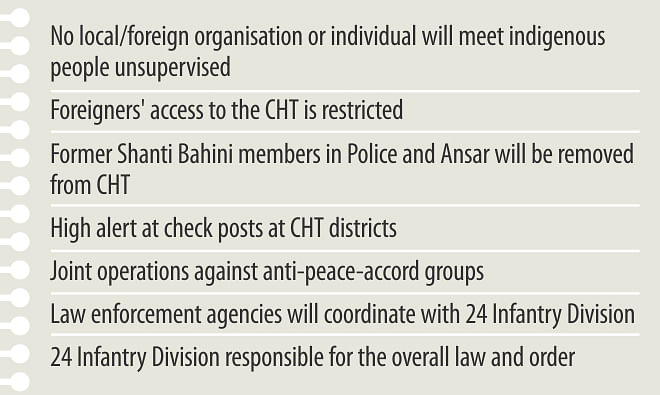Anger over hills ban
Anger over hills ban
Experts at roundtable term Home's directive anti-CHT peace accord, unconstitutional

Eminent citizens have slammed the recent government order banning Bangladeshi or foreign individuals or organisations meeting and talking unsupervised with indigenous people of the hill districts.
The order states that such interaction must take place in presence of members of the armed forces and local administration.
The order came from people who were against implementation of the CHT Peace Accord, the eminent citizens said, terming it unconstitutional, undemocratic and racist.
The views came at a roundtable discussion on the 11-point Home Ministry order regarding Chittagong Hill Tracts (CHT). Nagorik Shamaj organised the discussion at Dhaka Reporters Unity yesterday morning.
“This is similar to Nazi Germany, where Jews were not allowed to talk to Germans,” said human rights activist Hameeda Hossain. “These decisions raise the question if CHT is a part of Bangladesh, or if we want to use it as a colony that is heavily militarised and ruled by different laws, while the constitution is only applicable to Bangladesh.”
The order authorised by State Minister for Home Asaduzzaman Khan Kamal also restricts foreigners' access to the Chittagong Hill Tracts, and puts check-posts at the entrances to Rangamati, Khagrachhari and Bandarban on higher alert.
“The orders should be a cause for concern for every Bangladeshi citizen as these go against the core values of the country's Liberation War,” said CHT Commission member Iftekharuzzaman, “The restriction on movement and speech in one part of the country is shamelessly discriminatory, unconstitutional and a violation of human rights.”
He also hinted that legal action would be sought against implementation of the orders.
As per the directive, UNDP has to submit a report on the implementation and outcomes of its $160 million development projects in the CHT in the last 10 years.
Iftekharuzzaman said armed forces who were carrying out projects in the name of “peace and development” with tax-payers' money should also then be asked to do the same.
Sara Hossain, honorary executive director of Bangladesh Legal Aid and Service Trust, said these decisions, taken unilaterally by the government, and were unconstitutional and part of a conscious effort at “othering” the indigenous communities. “If a foreigner or Banglaee marries a pahari, then are we to assume that the armed forces or local administration must also be present in their bedroom?” she asked.
Pankaj Bhattacharya opined that the order institutionalises the long process of militarisation of the CHT. “It proves that Banglaees are a colonial and fascist people, much like the Nazis, Pakistanis and Israelis,” he said.
The problems in the CHT were not security issues, but rather political ones, and must be resolved through political means, he added.
Syed Abul Maskud, noted columnist, said, “Such decisions can only come through discussions in parliament, not from bureaucrats behind closed doors. No ministry has the mandate to make such decisions.”
The order makes a mockery of the Peace Accord and signals an ominous future for the region and for the country at large.
“We will try to initiate a dialogue with the home ministry officials and demand cancellation of these orders,” he added. “We will go to the court, if our demands fall on deaf ears.”
Moderated by Dhaka University teacher Rebaet Ferdous, Prof Mezbah Kamal also spoke.
Meanwhile, Human Rights Forum Bangladesh (HRFB) in a statement condemned the home ministry decision and said it was a blatant assurance of government support in favour of land acquisition.
The statement, issued by the forum's convener Sultana Kamal, criticised the CHT ministry's assurance to extend its support if BGB needed land from the forest department to establish border outposts.
“This raises serious concerns in the context that land disputes remain at the heart of the CHT conflict, [and] local residents are severely affected by land acquisitions,” it read.
Calling on the government to cancel its decision, it urged civil society, members of parliament, mass media and other stakeholders to raise their voices against the order.